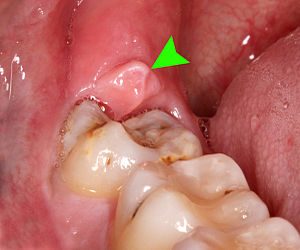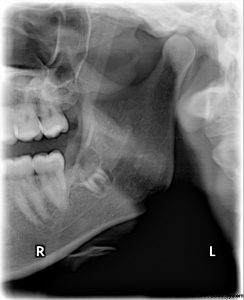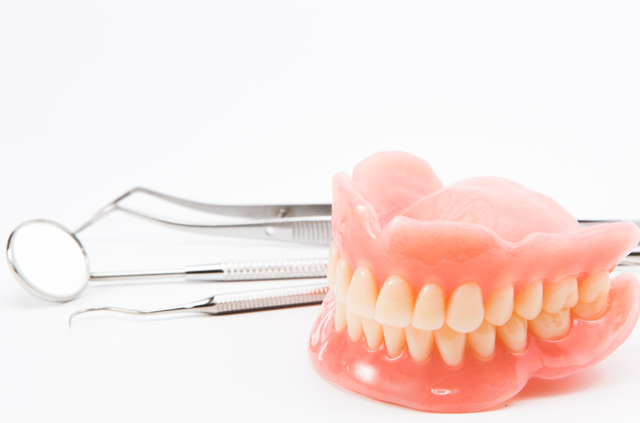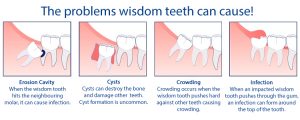Why would I need to have my wisdom teeth removed?
Wisdom teeth are the third and last molars on each side of the upper and lower jaws. They are also the last teeth to emerge; they usually appear when a person is in their late teens or early twenties. Wisdom teeth don’t always need to be removed. Its rarely an emergency so you are unlikely to require an Emergency Dentist near me. For many people, they come through typically and don’t cause any problems. However, as your wisdom teeth are your last teeth to come through, there’s often not enough space in your mouth for them to grow correctly. They can get partially stuck in your gums, or grow at an angle. This is called an impacted wisdom tooth. Even impacted wisdom teeth don’t always need to be taken out if they aren’t causing any symptoms.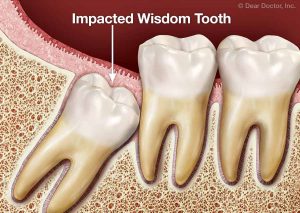
Sometimes though, the way an impacted wisdom tooth is positioned can make it easy for food and bacteria to get trapped in the gum. This can lead to swollen and sore gums (pericoronitis), tooth decay and infection. If you’re having problems such as these, your dentist may recommend taking the impacted tooth out.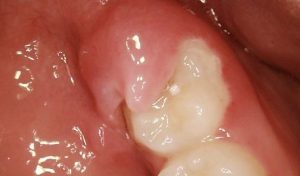
Having your wisdom teeth removed is a conventional procedure in the UK. It’s usually done in your late teens or twenties when your wisdom teeth come through.
Similar to general surgical extraction, the removal of wisdom teeth will begin with an x-ray to establish its position and angle in the gum. If your dentist feels that your tooth may have enough room to grow through without causing problems, they may suggest that extraction is not necessary.
If extraction is necessary, however, then you will be given a local anaesthetic before the process begins. This will block the pain present in your gums during the procedure while you remain awake. Wisdom teeth extraction is similar to the removal of any other molar, and involves the widening of the tooth socket, separating the tissue and bone that holds the tooth. Once the tooth is loosened, it will then be removed entirely. If your tooth has deep roots, however, it may be difficult to extract. If this is the case, your dentist may need to cut through the gums and remove some of your bone to remove the tooth.
However, if your dentist thinks your tooth is particularly challenging they may suggest you have the procedure under general anaesthetic. The more impacted the wisdom tooth is, the more complex the process to remove it. A vital nerve in the lower jaw can sometimes be very intimately related to the wisdom tooth which will make its removal riskier.
What are the alternatives to wisdom teeth removal?
If your wisdom teeth aren’t causing you any problems, even if they’re impacted, then you won’t need to have them taken out.
If your dentist thinks there’s a high risk of the nerves around your tooth being damaged, you may be offered a coronectomy. This is a procedure where the crown of the tooth is taken out, but some of the roots are left in place. This may help to reduce the chances of nerves around your tooth being damaged.
Coronectomy Procedure
This treatment involves removing the crown of the tooth and leaving the roots intact in your jaw. Although the roots may have viable pulp tissue, pupal therapy isn’t necessary as the roots will heal over with bone and eventually move away from the nerve. A coronectomy is preferable to extraction as a means of preventing neurological damage.
A small percentage of people may later need to have the retained roots extracted because they have begun to emerge. But if this happens, the roots will be far enough away from the nerve that the extraction will not harm it.
Who’s a Good Candidate?
Your oral surgeon will be the best judge of whether a coronectomy is an option for your condition, but it would only be recommended if the roots of your tooth are close to the nerves. There are other situations when this procedure would not be advisable:
• Tooth and root are infected.
• The tooth is mobile, or root mobility is discovered during surgery.
• The tooth is horizontally impacted along the nerve (sectioning the tooth would injure the nerve).
Talk to your dentist for more information about your choices.
What to Expect After the extraction of your wisdom tooth
What happens after you have your wisdom teeth removed will depend on the type of anaesthesia you have. If you have general anaesthesia or sedation, make sure someone can take you home. Ask someone to stay with you for a day or so while the anaesthetic wears off.
After local anaesthesia, it may take several hours before the feeling comes back into your face and jaw. Take special care not to bump or knock the area. Don’t eat or drink anything for the first six hours after the procedure. You might have some discomfort as the anaesthetic wears off. But you’ll be offered pain relief, as you need it. You will be able to go home when you feel ready.
Your dentist or oral surgeon should give you some advice about looking after your teeth and gums before you go home. You may be given painkillers and mouthwash to use at home. You may also be prescribed a course of antibiotics to take if there are signs that you have an infection when your tooth is taken out.
It may take a few days to feel completely better after wisdom teeth removal. You’re likely to have some pain and discomfort after the procedure. This is usually worse for the first couple of days. You can take over-the-counter painkillers such as paracetamol or ibuprofen. Your dentist or surgeon may suggest you take both medicines because they can work well together to reduce pain.
As well as some pain, you may also have some swelling and stiffness in your jaw for a couple of days. This can make it difficult to open your mouth. Using an ice pack wrapped in a towel can help to reduce this.
Side-effects of wisdom teeth removal
You may experience temporary side effects following the procedure. The main side effects of wisdom teeth removal include:
• Pain, swelling and bruising around your jaw;
• Difficulty opening your mouth;
• Bad breath;
• Tiredness; and
• Sensitive teeth around where the tooth was removed.
Any side-effects should get better within two to three days after your wisdom teeth are removed.
Why Aftercare is Important – Emergency Dentist near me
To prevent potential problems after removing wisdom teeth, here are your post-extraction healing instructions:
Swelling
Apply ice packs to the outside of your mouth intermittently (20 minutes on, 20 minutes off) for up to two days to minimize swelling, bruising or any discomfort. If your tooth was infected before removal, your dentist might ask you to use warm, moist compresses rather than ice.
Bleeding
Expect some bleeding, and keep a gauze pad over the extraction site for 30 minutes after surgery. For more massive bleeding, bite down on a gauze pad or place your fingers over the pad consistently for 10-15 minutes before removing it. Another alternative is to use a moistened tea bag for the same amount of time. The tannic acid in the tea contracts the bleeding vessels, which helps the blood clot set.
Mouth Care
Limit eating, drinking and talking for the first two hours following surgery, and plan to rest for the remainder of the day. To keep from dislodging the blood clot, don’t rinse vigorously and use a straw when drinking.
Additionally, avoid rigorous exercise for a few days, as well as smoking or spitting excessively on the day of the surgery, or as long as there is bleeding. After 12 hours, you can gently rinse with a diluted mouthwash or a salt water rinse. Carefully brush your teeth the night of the surgery, but avoid the surgical area as best as you can.
Medications
Take prescribed pain medications and antibiotics for infection precisely as directed by your dentist. And remember, if you are taking an active narcotic pain medication, you’ll be asked not to drive or operate machinery and to avoid alcoholic beverages.
When to Call Your Emergency Dentist near me
Any pain and swelling you have should improve each day, but call your Emergency Dentist near me if you experience any of the following:
• Swelling that gets worse instead of better.
• Excessive bleeding that won’t subside with pressure.
• Severe, throbbing pain three to four days following surgery.
• An elevated fever that persists.
Whether you have one wisdom tooth removed or all four, keep in mind that your dentist knows how to get you through this procedure without complications.
If you’re having your wisdom teeth extracted, the recovery time can be more significant depending on your oral hygiene, your body’s ability to heal, and other extrinsic factors, such as your age and length of procedure time. If you use tobacco, smoking after wisdom teeth removal can cause complications leading to infection and extended recovery time.
Possible Complications of wisdom teeth removal
Complications are when problems occur during or after the procedure. These may include the following:
• Infection of the tissues around the area where your wisdom tooth was removed.
• Dry Socket.
• Damage to the teeth nearby.
• Nerve Damage
FAQ:
Do I need time off work after wisdom teeth removal?
Wisdom teeth removal is a relatively minor procedure – you won’t need to take a lot of time off work. The time you need depends on what your job is, the type of anaesthetic you had and how quickly you recover. Its rarely an emergency and is planned with you dentist, so you wont need an Emergency Dentist near me.
If you have a job where you’re relatively inactive, then you should be back to work a day or two after the procedure. If you have a position where you’re physically active or doing heavy manual job, you may need to take a bit longer off.
It’s good to get back to your routine as soon as possible. You don’t need permission from your dentist or surgeon to go back to work – you can go when you feel ready.
Can I have wisdom teeth taken out while I’m pregnant?
You can have an anaesthetic to have wisdom teeth taken out when you’re pregnant. However, your dentist or surgeon will only advise having the procedure if it can’t wait until after your baby is born. This is to reduce the risk of any problems for you and your baby. If your wisdom teeth need to be removed, the second trimester is the best time for this to happen. Your dentist or oral surgeon will discuss your options with you.
What is dry socket?
Dry socket is when the blood clot that develops in the hole where your tooth was gets dislodged. This leaves the bone underneath exposed, and it can be quite painful. Dry socket can also cause bad breath.
Around five in every 100 people who have a wisdom tooth removed develop dry socket. You’re more likely to get it if you’re a woman, and if you have teeth removed from your lower jaw, rather than the upper one.
The primary symptom is a pain, which starts two to three days after the tooth is taken out and which gradually gets worse. The pain can spread to your ear and neck and can be severe. The pain and other symptoms can last for up to 10 days after your procedure. If you need an Emergency Dentist near me, please contact us.
Mouthwashes containing the antiseptic chlorhexidine can help stop you getting dry socket. Your dentist or surgeon may prescribe this for you.
If you have severe pain and ordinary painkillers aren’t helping, you should visit your dentist immediately. Treatments for dry socket include analgesics, rinsing out the socket to clean it, and packing the socket with a dressing soaked in painkillers and antiseptic.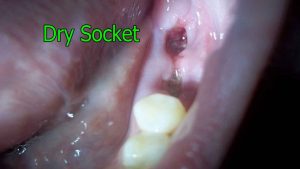
What is nerve damage?
Damage to the nerves that are positioned close to the roots of lower wisdom teeth. This can result in debilitating temporary or permanent numbness in the tongue, teeth, gums, lower lip and chin. This can also cause pain, tingling, pins and needles and numbness. This can affect your lips, tongue, gums and teeth. It’s usually temporary, but there is a small chance it could be permanent. We can be your Emergency Dentist near me so please do contact us if we can help consult you. Have a look at our jaw problems and headaches information.


